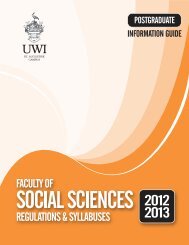Faculty of Humanities and Education (Postgraduate) - The University ...
Faculty of Humanities and Education (Postgraduate) - The University ...
Faculty of Humanities and Education (Postgraduate) - The University ...
Create successful ePaper yourself
Turn your PDF publications into a flip-book with our unique Google optimized e-Paper software.
POSTGRADUATE REGULATIONS & SYLLABUSES 2012 - 2013<br />
THE FACULTY OF HUMANITIES & EDUCATION<br />
C. Classroom/School-Based Research<br />
This module is specifically designed to emphasize the role<br />
<strong>of</strong> the teacher as researcher. It will make teachers aware<br />
that classroom <strong>and</strong> school research can <strong>and</strong> should be an<br />
integral part <strong>of</strong> their day-to-day practice.<br />
OBJECTIVES<br />
Teachers will have an opportunity to:<br />
1. become familiar with the essentials <strong>of</strong> educational<br />
research;<br />
2. acquire the skills required to conduct classroom <strong>and</strong><br />
school-based research.<br />
D. <strong>The</strong> Use <strong>of</strong> Media in <strong>Education</strong><br />
<strong>The</strong> module will be delivered through lectures <strong>and</strong> practical<br />
sessions. Lecture sessions will focus on theoretical issues<br />
<strong>and</strong> will provide introductions to the practical sessions. <strong>The</strong><br />
practical sessions will be conducted in curriculum groups<br />
where students will develop resources appropriate for use<br />
in their curriculum areas. <strong>The</strong>se products will be presented<br />
in plenary sessions <strong>and</strong> submitted in the curriculum<br />
portfolio.<br />
OBJECTIVES<br />
Teachers will:<br />
1. explore basic concepts <strong>of</strong> educational technology;<br />
2. evaluate the attributes <strong>of</strong> print <strong>and</strong> electronic media<br />
for classroom use;<br />
3. consider the role <strong>of</strong> media in student construction <strong>of</strong><br />
meaning from both verbal <strong>and</strong> visual information;<br />
4. be sensitised to learner characteristics that affect<br />
media selection <strong>and</strong> use;<br />
5. design <strong>and</strong> develop media resources for use in<br />
classroom settings;<br />
6. develop competence in using equipment with<br />
resources prepared for instruction.<br />
CONTENT<br />
• <strong>The</strong> nature <strong>of</strong> instructional media<br />
• Media <strong>and</strong> communication<br />
• Media <strong>and</strong> literacy<br />
• <strong>The</strong> overhead projector<br />
• Charts <strong>and</strong> posters<br />
• Slides <strong>and</strong> photographs<br />
• Videos<br />
• Information technology<br />
ASSESSMENT<br />
<strong>University</strong> attendance requirements must be met (at least 75%).<br />
In addition, students may be required to make presentations<br />
<strong>and</strong>/or submit projects in their curriculum portfolios.<br />
E. Electives<br />
In the Diploma programme, teachers are exposed to<br />
a range <strong>of</strong> teaching skills <strong>and</strong> ideas for implementing<br />
curriculum. <strong>The</strong>y also become sensitized to the many ways<br />
in which personal characteristics, talents, <strong>and</strong> interests<br />
contribute to their pr<strong>of</strong>essional practice. In recognition<br />
<strong>of</strong> the implications <strong>of</strong> these aspects <strong>of</strong> a teacher’s life, the<br />
electives will seek to engage teachers in activities that<br />
enhance personal development.<br />
OBJECTIVES<br />
Teachers will have an opportunity to<br />
1. develop their creative resources;<br />
2. explore new areas <strong>of</strong> interest;<br />
3. become sensitized to factors that affect personal wellbeing;<br />
4. underst<strong>and</strong> how personal development impacts on<br />
pr<strong>of</strong>essional practice.<br />
CONTENT<br />
Students will select from such areas as:<br />
• Art <strong>and</strong> Craft<br />
• Cooking<br />
• Counselling<br />
• Dance<br />
• Gardening Skills<br />
• Music<br />
• Photography<br />
• Public Speaking<br />
• Technology in Teaching<br />
• Yoga<br />
Electives may vary from year to year. Each student will be<br />
required to enrol in one elective.<br />
ASSESSMENT<br />
<strong>University</strong> attendance requirements must be met (at least 75%).<br />
In addition, students may be required to make presentations<br />
<strong>and</strong>/or submit projects in their curriculum portfolios.<br />
F. Arts In <strong>Education</strong><br />
OBJECTIVES<br />
1. Innovative learning situations by using material from<br />
the curriculum.<br />
2. Innovative learning situations from extra-curricular<br />
material.<br />
3. Stimulate <strong>and</strong> develop students’ creative resources.<br />
4. Assess students’ creative development.<br />
ASSESSMENT<br />
<strong>University</strong> attendance requirements must be met (at least 75%).<br />
In addition, students may be required to make presentations<br />
<strong>and</strong>/or submit projects in their curriculum portfolios.<br />
79

















